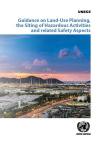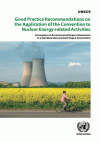Publications
Displaying Results 741 - 760 of 2807
- English
- English
This document contains information on the purpose and role of UNECE Country Profiles in facilitating legal, political and infrastructural reforms in UNECE countries; the rationale behind the country profiles structure; and the guidelines for the preparation of country profiles. The current revised guidelines reflect findings and recommendations of the independent evaluation of UNECE country
- English
Practical guidance on reforming legal and institutional structures with regard to the application of the Protocol on Strategic Environmental Assessment ENG/RUSThis practical guidance aims to assist countries of Eastern
- English
Global Tracking Framework: UNECE Progress in Sustainable Energy(UNECE ENERGY SERIES No. 49)Also available in French and Russian: Cadre mondial de suivi : Progres realises par la CEE en matiere d'energie
- English
The Guidance on Land-Use Planning, the Siting of Hazardous Activities and related Safety Aspects has been developed in close cooperation with the constituencies under three legal instruments of the United Nations Economic Commission for Europe (UNECE) – the Convention on the Transboundary Effects of Industrial Accidents (Industrial Accidents Convention), the Convention on Environmental Impact
- English
- English
The Guidance on Land-Use Planning, the Siting of Hazardous Activities and related Safety Aspects has been developed in close cooperation with the constituencies under three legal instruments of the United Nations Economic Commission for Europe (UNECE) - the Convention on the Transboundary Effects of Industrial Accidents (Industrial Accidents Convention), the
- English
This report presents the findings from the assessment of the water-food-energy-ecosystems nexus, linked with a study of benefits of transboundary cooperation, in the Drina River Basin, mainly shared by Bosnia and Herzegovina, Montenegro and Serbia which was carried out from 2016 to 2017 in the framework of the UNECE Water Convention’s Programme of Work. The assessment aimed to foster
- English
As the second most polluting industry, the textile sector is responsible for a large portion of the world’s CO2 emissions and industrial waste, not to mention the exploitation of “indecent” working conditions. At the same time, the industry has a complex value chain, with production facilities located all over the world, which makes it very hard to gain accurate information about sources and
- English
Within the United Nations Economic Commission for Europe (UNECE), the United Nations Centre for Trade Facilitation and Electronic Business (UN/CEFACT) has developed a series of some 30 recommendations and standards that are used worldwide to simplify, standardize and harmonize trade procedures and information flows. Many of these are now international standards of the International
- English
The Economic Commission for Europe (UNECE) has a long history of offering trade facilitation guidance, especially on the topic of Single Window. Since its emergence in 2004, Recommendation 33 on implementing a Single Window has been widely received as the reference on the subject and is used as the basis for many other organizations’ work as well as the cornerstone of many national
- English
Recommendation 42 on Trade and Transport Facilitation Monitoring Mechanisms (TTFMM) addresses issues related to institutional arrangements and methodology in designing and implementing TTFMM. It is an important contribution to UNECE’s suite of Trade Facilitation recommendations and guidance material.Download the Publication ECE/TRADE/
- English
Since the introduction in 1973 as the UNECE Recommendation No. 1, the UN Layout Key (UNLK) has provided Governments, organizations and the business community with a basis for a standard and aligned design of documents used in trade and transport. This has led to a major improvement in the standardization of trade documents in many countries throughout the world.Most international organizations
- English
Conventional economic statistics, such as national accounts and employment measures, are largely designed to measure the market economy and in most countries exclude unpaid household service work. Economists have argued for many years that ignoring these services introduces biases in various areas of economic analysis. For instance, an increase in childcare or long-term care provided by the
- English
This publication provides comparable data on causes, types and results of accidents in Europe, Canada and the United States. Data are organized by nature of accident and surroundings; accidents while under the influence of alcohol; and the number of persons killed or injured, by category or road user and age group. As background data, figures on the number of road vehicles in use and vehicle-
- English
- English
In the UNECE region, countries’ approaches to poverty measurement vary significantly. There is a large spectrum of poverty indicators, wide varieties of definitions, methods, thresholds and data sources that are not fully matched by national or international guidelines.This publication provides guidance on applying various measurement approaches and aims to improve the international
- English
Coordinated Operations of Flexible Coal and Renewable Energy Power Plants: Challenges and Opportunities ENERGY SERIES No. 52 This report argues that coordinated operations of renewable energy and fossil fuel- red power plants could help increase reliability and eciency of the whole system. At the same time, given the inherent
- English
Guidelines for Application of the United Nations Framework Classification for Resources (UNFC) to Uranium and Thorium Resources (ECE ENERGY SERIES No. 55) (December 2017)This publication provides non-mandatory guidance for the application of the United Nations Framework Classification for Resources (UNFC) to uranium and thorium resources.
- English
Removing Barriers to the Use of Natural Gas as Maritime Transportation FuelENERGY SERIES No. 54This report on Removing Barriers to the Use of Natural Gas as Maritime Transportation Fuel is another step in ourexploration of the catalytic role of natural gas in attaining the Sustainable Development Goals, and in




















